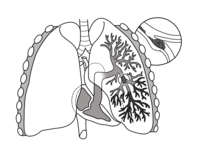
Photo from wikipedia
Interleukin (IL)‐10 has anti‐inflammatory and CD8+ T‐cell‐stimulating properties. Pegilodecakin (pegylated recombinant human IL‐10) induces intratumoral antigen‐specific CD8 + T‐cells and upregulates IFNγ and major histocompatibility complexes (MHC) I and II. Pegilodecakin has… Click to show full abstract
Interleukin (IL)‐10 has anti‐inflammatory and CD8+ T‐cell‐stimulating properties. Pegilodecakin (pegylated recombinant human IL‐10) induces intratumoral antigen‐specific CD8 + T‐cells and upregulates IFNγ and major histocompatibility complexes (MHC) I and II. Pegilodecakin has single‐agent activity with manageable toxicity in advanced renal cell carcinama (aRCC) (data cutoff 24 March 2016). Pegilodecakin with pembrolizumab or nivolumab revealed clinical activity in aRCC (data cutoff 1 July 2018). Here, we report for the first time the results of pegilodecakin+ pazopanib, and final results for monotherapy and long‐term follow‐up with pegilodecakin + anti‐programmed cell death 1 (anti‐PD‐1) inhibitors (data cutoff 19 February 2019). Phase 1/1b multi‐cohort dose escalation IVY study enrolled 353 patients. Sixty‐six patients with aRCC were treated with pegilodecakin alone or with pazopanib or anti‐PD‐1 inhibitor in cohorts A, G, H and I (data cutoff 19 February 2019). Primary endpoints included safety and tolerability. Secondary endpoint was tumor response by immune‐related response criteria (irRC). Pegilodecakin plus nivolumab or pembrolizumab yielded median progression‐free survival (mPFS) of 13.9 months and 6‐month PFS probability of 60%, 76% 1‐year overall survival (OS) probability and 61% 2‐year OS probability. Pegilodecakin monotherapy produced mPFS of 1.8 months, 6‐month PFS probability 25%, 1‐year OS 50%, and 2‐year OS 17%. Median OS was not reached in both combinations. Objective response rates (ORRs) were 33% with pazopanib and 43% with anti‐PD‐1. Most common Grade 3/4 treatment‐related adverse events included anemia, thrombocytopenia and hypertriglyceridemia. In these heavily pretreated renal cell carcinama cohorts of IVY, pegilodecakin+anti‐PD‐1 inhibitor showed promising clinical activity. Safety profile of pegilodecakin alone and with anti‐PD‐1 inhibitors was consistent as previously reported.
Journal Title: International Journal of Cancer
Year Published: 2021
Link to full text (if available)
Share on Social Media: Sign Up to like & get
recommendations!